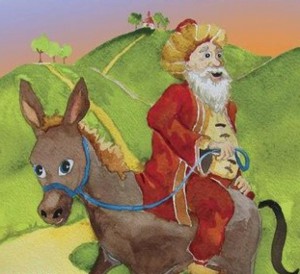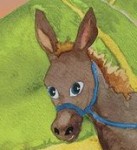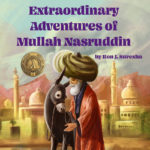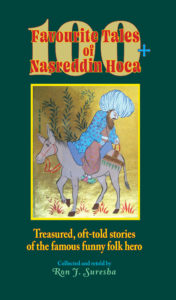
Cat, or Meat?

Nasruddin riding his donkey
Once Nasruddin went to the village butcher, Akram, to buy three kilos of the finest cut of meat he could find, instructing the butcher, Akram, to trim it well. He brought the select piece of mutton home to Fatima for her to prepare kabobs with rice for them at dinner, then he went out with his donkey to sell pickles in town, which was one of the things Nasruddin did for work.
Fatima eagerly set about preparing the kabobs, first grinding the meat very fine, spicing it exactly to Nasruddin’s liking, and then roasting it until the scent of the delicious food filled their humble home and wafted out the open windows, and the breeze carried the aroma on to the neighborhood.
As she was close to finishing Nasruddin’s meal, three of Fatima’s friends — Ina, Turan, and Setare — who from their homes nearby could smell the delicious roasting meat, just happened to stop by for a visit. Hoş geldiniz, she said, waving them inside.
As she served them cups of sweet steaming tea and they all laughed and chatted, Fatima knew it would seem slim hospitality to serve her friends a second cup of tea when the air was filled with the tantalizing scent of the cooked lamb kabobs.
They won’t eat much, Fatima thought, as she made up a platter of the kabobs, covered them with perfectly cooked rice, and poured warmed butter over it all. There will be plenty left for my husband.
Fatima was right that they wouldn’t eat much — rice. Her neighbors helped themselves and unearthed the savory kabobs, all the while chatting about this and that and complimenting Fatima on her excellent cooking. Fatima beamed at their high praise as they ate, encouraging them to enjoy themselves.
Very soon after the last shred of meat was eaten, the women lauded Fatima as a cook and hostess, thanked her with invitations to come visit, and left to tend to their own homes and chores.
There was hardly any time left for Fatima to rearrange the remaining rice on a smaller platter before Nasruddin arrived home. He sat down for dinner and said, “The lamb smells absolutely delicious, my dear. What a wonderful cook you are!”
He stuck his fork into the mound of rice, but instead of stabbing a spicy kabob, there were only grains. He plundered the pile, but came up with nothing but rice.
Nasruddin was furious and demanded to know where the lamb he had brought went. “The whole house and yard smell of broiled mutton, but you feed me only rice. Woman, what did you do with the meat?”
Fatima had never seen Nasruddin so angry. “The cat ate it,” she blurted out, “while I stepped outside — to get cucumbers from the garden — just before you arrived.”
Nasruddin looked from Fatima to the scrawny cat stretched out lazily before the fire, and from the sleeping cat to Fatima.
He got out of his saddlebag the scales and weights he used for weighing pickles. On one side of the scales, he placed three kilogram weights. Nasruddin gently picked up the sleeping cat and placed her on the other side of the scales. He picked up the scales, which wavered back and forth slightly but soon stilled to show an even balance between the weights and the cat.
“The meat weighed three kilos,” said Nasruddin sternly. “Now the cat weighs three kilos.”
“Three kilos,” Fatima echoed faintly.
Nasruddin looked back and forth between the equally loaded sides of the balance, then glared at Fatima, finally.
“If I am weighing the cat, then where is the meat?” asked Nasruddin. “And if I am weighing the meat, then where is the cat?”
Fatima could only shrug her shoulders.
Excerpted from The Uncommon Sense of the Immortal Mullah Nasruddin: Stories, Jests, and Donkey Tales of the Beloved Persian Folk Hero
Your Daily Nasruddin
A popular story, and rightly so, demonstrating both the foolishness and cleverness of Nasruddin and Fatima. Often the Mullah / Fatima stories are jokes at the expense of just one of the characters, but the sustained deception allows both to interact in a domestic environment.
Wanting to impress her friends, Fatima thoughtlessly offers them the kabobs that she made for her husband, and of course they devour all the delicious kabobs that were meant for his dinner.
Too late, Fatima realizes her blunder, so she tries to deceive him, first by pretending the meat is buried in the rice, and then by blaming the cat for having eaten it.
As a pickle seller, Nasruddin should know what three kilos of meat weighs. But the emaciated cat doesn’t look any fatter! So he methodically gets out his balance and checks the weight of the innocently sleeping cat, which turns out to be exactly the same as that of the meat he bought and was expecting in his stomach!
Finally, he turns to Fatima to confront her on this deception, or at least for another explanation. What can she do but shrug?
 Your Daily Nasruddin
Your Daily Nasruddin 






Do You Believe Me, or the Donkey?
Do You Believe Me, or the Donkey?
Excerpted from The Uncommon Sense of the Immortal Mullah Nasruddin: Stories, Jests, and Donkey Tales of the Beloved Persian Folk Hero
Another example of Nasruddin’s brilliant idiocy.